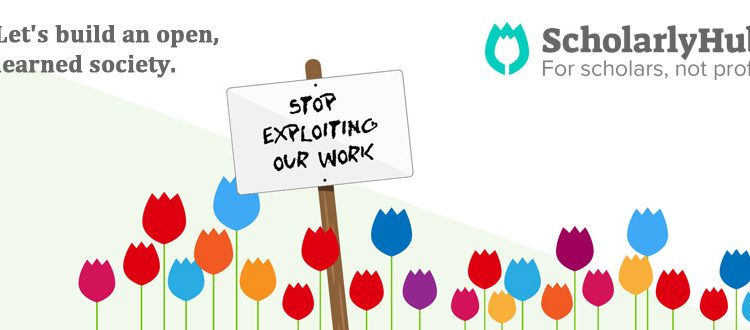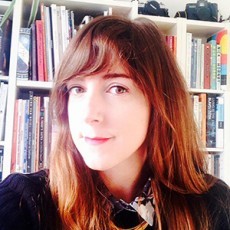The Future of Open Access Publishing: An Interview With ScholarlyHub

In the current academic publishing environment, a number of scholarly social networks happen to be in the news mainly for copyright infringement allegations. Such academic social networks are a common place for researchers and authors to connect with others in the community and share their published papers online. However, these networking platforms do not have any defined rules for sharing of published articles resulting in illegal sharing of paywalled articles. ScholarlyHub aims to change this aspect of scholarly social networks and become a member-owned and run non-profit platform, where researchers can share and improve scholarly communication between the community and the general public. Apart from that, ScholarlyHub also plans to launch an open publishing platform that would offer open access to many more authors and researchers.
As part of our interview series on Connecting Scholarly Publishing Experts and Researchers, we had the opportunity to speak with Tashina Blom and Guy Geltner from ScholarlyHub.

Guy Geltner is a medieval historian and open access activist

Tashina Blom is a cultural analyst, author, archivist, and activist
What would be the primary focus areas for ScholarlyHub in 2018?
Since the launch of our crowdfunding campaign, we have received lots of positive coverage in news and social media, and 1,000+ people have now subscribed to our newsletter. The important thing is we have managed to raise more awareness to the problems facing scholarly communications today (as part of a greater threat to the public sphere) and in 2018 we want to keep rallying support for our solution to it.
We hope to have reached our crowdfunding goal by the summer of 2018, which means we will primarily focus on the campaign and on attracting new members. We can also add that several non-profit publishers, open access organizations, and learned societies have been knocking on our door since we launched. Although it is early, we are exploring possibilities to collaborate with organizations that share our values and can help bring us closer to our goal.
Could you tell us something about the challenges that are faced by the ScholarlyHub team?
So far, those who support open access and open science are on our side. The challenge we are facing now—beyond raising sufficient funds—is to also reach those academics who are less aware of the discussions around open access. Moreover, populist local and regional politics have been forcing research agendas in certain directions by reallocating funding. In doing so, they have impoverished the notion of scientific relevance, narrowed the horizons of science, and rendered vulnerable numerous scientific fields. The challenge we have set ourselves is to counter these trends by providing a sustainable alternative for bringing scholars closer together in an otherwise fragmented and often biased academic world–an environment where members, not metrics, matter most.
How is ScholarlyHub different from other for-profit scholarly networks like ResearchGate and Academia.edu?
While in the short term Academia.edu and ResearchGate provide important services to scholars, they are for-profit networks backed by venture capitalists. There is thus no knowing who will buy them out or who will pay to buy their users’ data. Scholars and scholarships are mere products on these sites, and those running them are beholden to the financial interests of their backers, not the public at large or scholars. In the end, you’ve no idea where your data might end up, what it will be used for, and whether you will remain in control of your work when a big publisher or tech giant buys the platform–something that already happened to Mendeley and the Social Science Research Network (SSRN), who were bought by Elsevier, for instance. The danger there is not necessarily access but the future leveraging of market share to squeeze even more money out of depleted public funds when selling journal subscriptions or other services built on the (mostly) free labor of scholars. ScholarlyHub cannot legally make a profit, it will never share or sell metadata to a third party. SH also aims to become a publisher, not only a repository and social network, which is currently an element entirely absent from the existing ASNs you mention.
Moreover, from the individual user’s perspective, members can choose to display (certain aspects of) their metrics or none at all. For-profit academic social networks cater to academics’ worst traits such as insecurity and vanity and tend to reinforce the myopic focus on the prestige of metrics, further exacerbating academia’s unhealthy stratification—with all its attendant biases on the basis of class, gender, race, and geographic location. We want to provide an inclusive and sustainable alternative that doesn’t treat scholarship as a product and doesn’t define scholars narrowly as academics working in research institutions. Instead, we hope to cater also to the needs of a diverse range of scholarship-using communities of practice such as non-profits, activists, and journalists.
Could you tell us more about your latest initiative to launch a nonprofit scholarly networking and publishing platform for researchers?
ScholarlyHub will be a non-profit framework, where members pay a small annual fee (directly or through an existing learned society, network, project or institution) and create personal, thematic, project-based, associational or institutional profiles and populate them with scholarly and educational materials as they see fit. These are stored in a searchable, real open access archive, and are directly viewable and downloadable from the portal by anyone (that is, not only members), without having to register or volunteer personal data. Members’ social-networking capacity, moreover, will be a top priority: they can join existing groups and create new ones, and engage in any and all activities on the platform, from recommending articles and creating events, mentoring, following and contributing to conference wikis and discussion boards, peer-reviewing and publishing articles, to curating journals and—crucially—setting up new virtual research platforms and teaching initiatives.
What are some of the benefits of ScholarlyHub in comparison to other similar open publishing platforms?
Other than testing the attractiveness of sliding-scale members’ fees as a model, ScholarlyHub shares the core values of other open access and open publishing initiatives and their sense of urgency in changing the world of scholarly communications. We start from different places, however. ScholarlyHub is not a wealthy foundation or backed by one, and is working outside the framework of traditional learned societies (though we certainly welcome them and their input). We also wish to operate cross-disciplinarily. Last but not least, we strive—ultimately—to provide a range of social networking and other services (including peer review and OA publishing) and we want to accommodate scholars beyond the traditional mold of an academic, that is someone with an advanced degree who holds (or is formally pursuing) a tenured position at a research institution.
That said, small or wide overlaps in separate but thriving endeavors such as Humanities Commons only make the need for such interventions more abundantly clear. Furthermore, there is no obstacle (from our perspective, at least) to coordinate efforts at 1) shrinking the pie of academic publishing from the absurd size it has now reached and the social injustices it perpetuates; and 2) creating inclusive spaces for diverse types of scholars and scholarship-using communities.
Bee for Open Access from ScholarlyHub on Vimeo.
Could you give our readers a brief idea about ScholarlyHub’s future goals?
We want to change the status quo and take a stand against academic and institutional inertia by offering a sustainable open access alternative to greedy publishers and for-profit portals. We aim to offer an inclusive environment with a diverse user base that makes research available to all and allows academics to take back control of their work. Ultimately, our goal is to help you pursue your curiosity and connect you with those who share it.
In your opinion, how is technology changing the landscape of academic publishing and what are some of the associated challenges?
This may be an obvious one, but it may help to start from the basics. For-profit publishers used to provide an indispensable service to the academic community: the only way to circulate ideas widely was to print them, bind them, and sell them. That was a process established publishing houses were best placed to oversee. However, the internet has changed everything, in ways that it would be redundant to explain. Yet that has not led to a real democratization of knowledge (what it is and who has access to it). It’s within this technological conundrum which has parallels in other aspects of the Web 2.0, which we are operating.
Congratulation on the milestone of the recent crowdfunding campaign going live. How will this funding help in the development of ScholarlyHub?
Our calculations, made after extensive discussions with finance and IT experts, suggest that the amount of Euro 500,000 will allow ScholarlyHub to develop a digital environment that can provide several basic services such as user profiles, an OA repository (including for datasets), feeds, and a working governance structure. It will also help support onboarding efforts, pay for servers, and regular staff activities. A stable and growing flow of members will allow the site to develop further and offer more services, including peer review support and various open source publishing protocols. Yet these must be discussed and prioritized by the members.
The architecture of our future site, which we hope to build together with our members, will reflect what the SH community says it needs, not what venture capitalists define as benchmarks or milestones for launching an IPO or selling it to the highest bidder. It will also refrain from overwhelming scholars’ profiles and publications with metrics that are rarely designed as quality indicators for a scholarship. We have already released some of the initial ideas about the design of the platform here in order to show you how we tried to embed these values in some of our initial designs for the site.
What are some of the other initiatives being undertaken to broaden the scope of partnership with publishers, repositories, research libraries, and organizations?
We are in the process of cementing a vast network of direct relationships with those institutions. For instance, we want to encourage learned societies to think with us about ways to move their journals away from for-profit publishers while using the ScholarlyHub subscription fees to replace their income from the publishers, and maybe even increase it—certainly while greatly reducing if not eliminating the cost to the end users of the research.
What is your policy on monitoring user-uploaded manuscripts and how different is it from the one adopted by ResearchGate? Do you anticipate any legal issues?
Scholars can upload papers as long as they are the lawful copyright owners or have the permission to do so. If a copyright infringement complaint is received with relevant evidence, the website will take the material down until proof to the contrary is provided. The website as a platform does not actively monitor data and is not responsible for the papers and for data generated by users and members. It is expected, however, that members will upload their own original work and treat others’ with respect.
ResearchGate recently got in trouble when it had to remove large numbers of research papers in breach of copyright. One of the problems they encountered was that users would often upload a copyrighted version of their own paper to the website. With ScholarlyHub we want to make scholars aware of what they stand to lose when they sign off the rights to their work. We want to address academics apathetic responses to open access while at the same time making it easier for scholars to choose open access, for instance, by offering publishing services and the opportunity to migrate existing journals to the platform and making them available as open access.
How can platforms like ScholarlyHub benefit researchers in ESL regions like China, Korea, Japan, and Taiwan?
First of all, it is important to note that research institutions in those countries are already quite well integrated into the international academic community. With ScholarlyHub we want to set up a cross-disciplinary platform that caters to academics and communities of practice around the world. We’re especially excited to offer a sustainable open access alternative to countries like Taiwan that have shown great commitment to open access. A recent article by the Huffington Post indicated that “75% of Taiwanese universities have officially boycotted Elsevier’s prestigious research journals.”
Quite often, Ph.D. scholars on visas get harassed and exploited by their thesis advisors. Do you plan to address this issue by launching a related service or platform?
This is an important issue. While we cannot solve this issue, we can facilitate open and confidential communication around it. For instance, by providing forums for discussions where we can protect the confidentiality of the members.
Do you have any words of advice for prospective Ph.D. students and early-stage researchers?
Don’t underestimate the increased impact of your research if you make it available as open access. At least weigh that up against the for-profit publisher’s promise of prestige.
You can check out the ScholarlyHub website and also follow them on Twitter and Facebook.
It was a great pleasure to talk to Tashina Blom and Guy Geltner. We sincerely thank them for taking the time to be a part of this interview and also wish them the very best in their future endeavors!
(This interview is a part of our interview series on Connecting Scholarly Publishing Experts and Researchers.)









